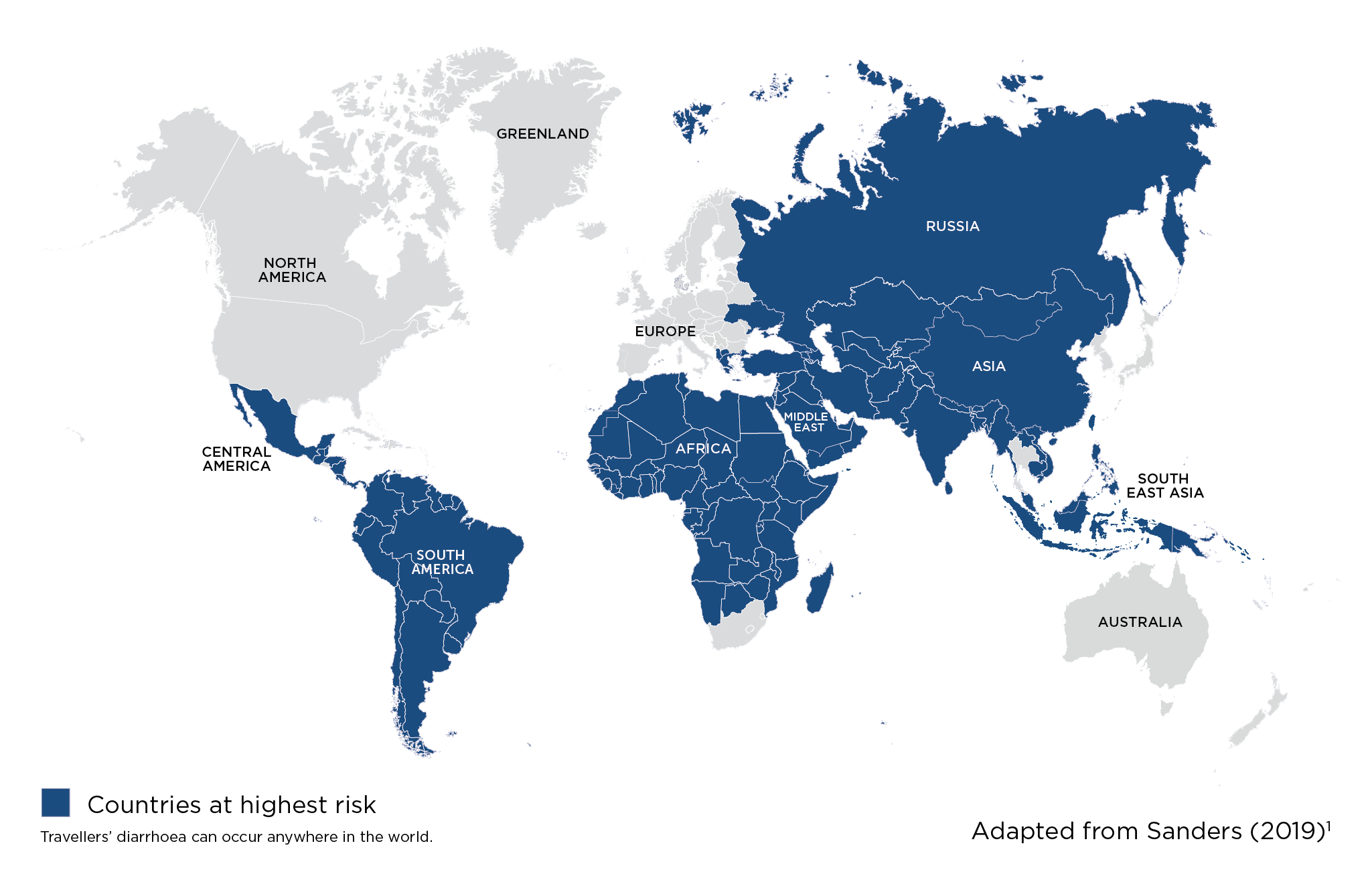More than 20% of travellers visiting high risk areas get travellers’ diarrhoea, which can significantly disrupt their travel plans.3,4
Risk areas for Travellers’ Diarrhoea

FAQs
-
Key fact
-
How do you get travellers’ diarrhoea?
Mostly from ingesting food or water that has been contaminated with the viruses, bacteria or protozoa which cause the disease.3,5
-
Which countries are affected by travellers’ diarrhoea?
Travellers’ diarrhoea can occur in many areas of the world but is the most common in Asia, the Middle East, Africa, Mexico, and South and Central America.1,2
-
What are the symptoms of travellers’ diarrhoea?
Travellers’ diarrhoea is defined as three or more unformed stools in a 24 hour period with at least one additional symptom.6 Symptoms can start from as little as 6 hours and will depend on the type of bug that has caused the infection. They may include watery or bloody diarrhoea, abdominal pain, fever, and vomiting.5
-
How serious is travellers’ diarrhoea?
Without treatment, travellers’ diarrhoea caused by bacteria usually lasts three to seven days, if caused by a virus it can last two to three days, or if caused by protozoa, it can last for weeks or months.5 Medical care should be sought if symptoms do not clear up within three days or immediately in the case of fever, blood and/or mucus in stools, altered mental state, severe stomach pain, jaundice or rash.4 Early medical care is also recommended for children, the elderly or vulnerable people who cannot tolerate fluids or are dehydrated.4
-
Can I prevent getting travellers’ diarrhoea?
You can take the following precautions to help reduce your risk of infection:
- Visit your nearest convenient pharmacy or specialist travel health clinic for a risk assessment before your trip
- Wash your hands frequently, especially before preparing or eating food, and after using the toilet4
- Ensure good hygiene is practiced when swimming. Don’t swim if you have diarrhoea, and avoid ingesting any pool water4
- Use boiled, bottled or disinfected water for drinking, preparing food and drinks, as well as brushing your teeth7
- Avoid ice in drinks7
- Avoid eating raw or undercooked meat, fruit and vegetables that you haven’t prepared yourself. It is also advised to avoid eating shellfish and seafood7
Ready to get started? Check now for your nearest travel health clinic.
Get friendly advice from the UK's largest network of travel clinics*.
* This list is not exhaustive and other travel health providers are available.
References
- Sanders JW, Riddle MS, Taylor DN et al. 18 – Epidemiology of Travelers’ Diarrhea. In eds. Keystone JS, Kozarsky PE, Connor BA et al. Travel Medicine Fourth Edition. 2019. Elsevier.
- Centers for Disease Control and Prevention. Advice for Travelers. Travelers’ Diarrhea. May 2022. Available online: https://wwwnc.cdc.gov/travel/page/travelers-diarrhea (Last accessed May 2025)
- Ericsson CD. Travelers’ diarrhea. Epidemiology, prevention, and self treatment. Infect Dis Clin North Am 1998;12:285–303
- NaTHNAc. Factsheets. Travellers’ Diarhhoea. February 2024. Available online: https://travelhealthpro.org.uk/factsheet/53/travellers-diarrhoea (Last accessed May 2025)
- Centers for Disease Control and Prevention. Yellow Book 2026. Preparing International Travelers. Travelers’ Diarrhea April 2025. Available online: https://www.cdc.gov/yellow-book/hcp/preparing-international-travelers/travelers-diarrhea.html (Last accessed May 2025)
- Steffen R. Epidemiology of travellers’ diarrhea. J Travel Med 2017;24:S2-S5.
- Centers for Disease Control and Prevention. Yellow Book 2026. Preparing International Travelers. Food and Water Precautions for Travelers. April 2025. Available online: https://www.cdc.gov/yellow-book/hcp/preparing-international-travelers/food-and-water-precautions-for-travelers.html (Last accessed May 2025)
UK-BOTB-2500032 May 2025
